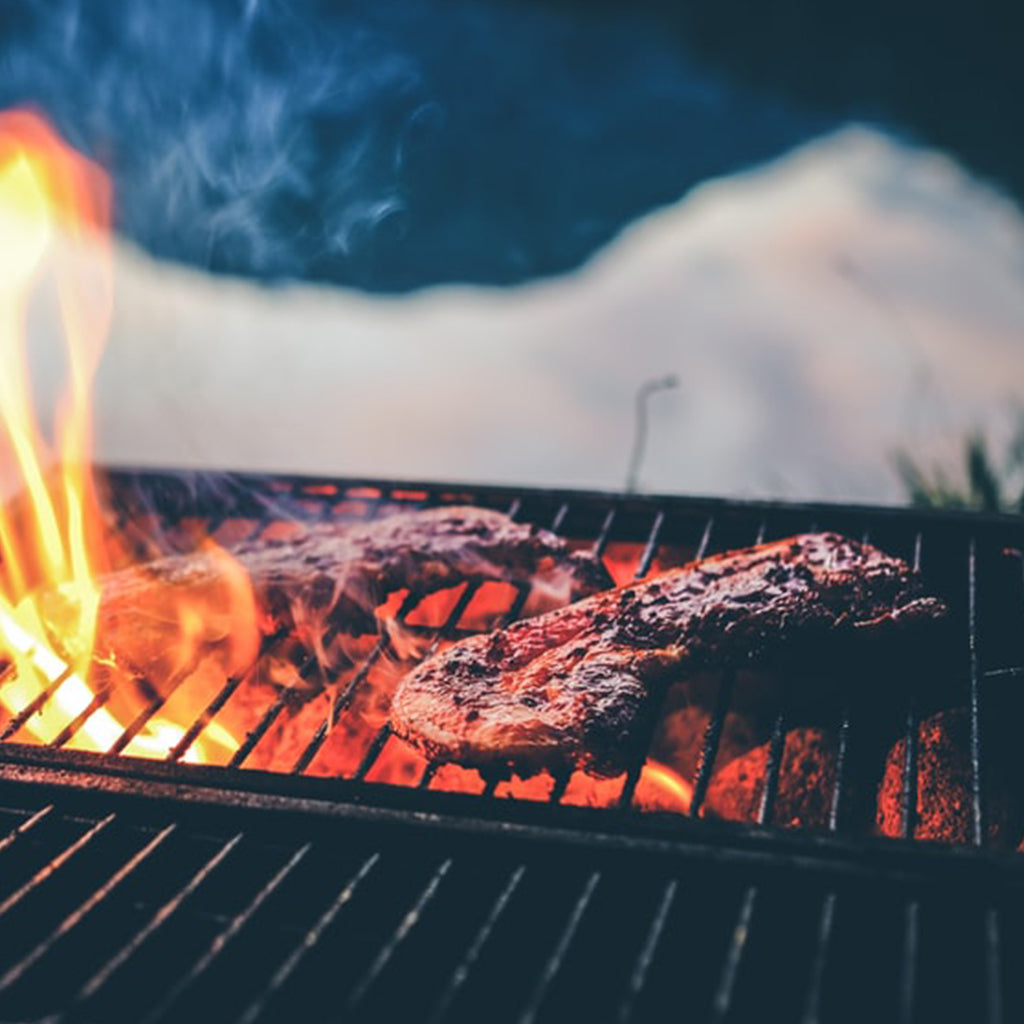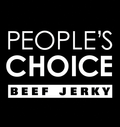The Carnivore diet is an exclusion-based diet that limits all food intake to meat, fish, and other animal foods like eggs and dairy products.
The Carnivore Diet—eating meat and animal products exclusively—is rapidly growing in popularity. Some of its most vocal advocates include Dr. Paul Saladino, author Shawn Baker and media personality Joe Rogan.
At this point, you're either extremely stoked on stumbling upon this diet or utterly grossed out. Either way, the Carnivore Diet seems to be more than just a trend.
It’s definitely one of the more controversial diets out there, but it’s worth exploring so you can make informed decisions.
Can you eat beef jerky on the Carnivore Diet?
Advocates of the Carnivore Diet claim the best part is the lack of restrictions on quantity. Some popular Carnivore Diet snacks include canned fish products, cheese crisps, pate, pork rinds, and of course, beef jerky.
Beef jerky can absolutely be enjoyed on the Carnivore Diet, but it has to be the right beef jerky. Focus on jerky with no carbohydrates, no sugars, and minimally-added ingredients. Ideally, you’ll want a beef jerky with nothing more than beef and little to no seasoning.
Sounds simple, right?
Not so fast. It can be really difficult, bordering on impossible, to find simple, old school jerky. Many beef jerky producers out there load their products with sugars, artificial ingredients, and seasonings. Lucky for you, you’ve come to the right place.
Our number one Carnivore Diet Beef Jerky is the Old Fashioned Original. If you're on the strict tip of the diet, this is your go-to Carnivore beef jerky.
This is REAL beef jerky. It’s the same sugar-free recipe started by our great grandfather back in the 1920s. Nothing more than beef, water, and seasoning.
- 100% USA Beef
- 16g of Protein, 2.5g of Fat, and 0g of Carb per Serving
- Very minimal seasoning. We use around 2 LB of seasoning for 100 LB of meat.
If you’re comfortable with a little more seasoning on the Carnivore Diet, but are still looking to maintain the zero-carb goal, browse our Sugar Free Beef Jerky collections. We have simple, minimal ingredient jerky with a little more flavor and variety.

Sample all of our sugar-free jerky options with the Health Nut Keto Jerky Box!
Keep reading to learn more about the Carnivore Diet.
Guide to the Carnivore Diet
- What is the Carnivore Diet?
- Carnivore Diet Food List
- Things to Eat on the Carnivore Diet
- Carnivore Diet Recipes
- Why the Carnivore Diet?
- Carnivore Diet Benefits
- Carnivore Diet Results
- Carnivore Diet vs Keto
- What is Ketovore?

What is the Carnivore Diet?
At its marrow, the Carnivore Diet consists of eating exclusively meat, fish, and other animal products, including eggs and certain dairy products. Put simply, no plants.
Kait Malthaner, health and fitness professional, explains the Carnivore Diet "as an elimination diet as you are removing all fruits, vegetables, nuts, seeds and grains.”
The diet is zero-carb. It completely restricts fruits, vegetables, nuts, legumes, nuts, grains, and seeds. To stay aligned with the zero-carb name, you must actively limit or eliminate your intake of certain dairy products containing the sugar lactose.
While the diet is similar to the popular low carb, paleo, and ketogenic diets, the Carnivore Diet's ultimate goal is to limit your plant intake to eat exclusively meat. That means restricting carbohydrate intake to zero. Since carbohydrates typically act as a primary source of energy, it is highly encouraged that you eat fatty meats to reach your daily energy needs.
The more extreme Carnivore Diet practitioners limit their liquid intake to just water and bone broth, avoiding tea and coffee because they are produced from plant material.
The diet itself provides no specific guidelines regarding serving size, calorie intake, macronutrient composition, or the number of meals or snacks to eat per day. We found most advocates of the Carnivore Diet encouraged eating with no limits on when or how much to eat. Dr. Paul Saladino generally recommends “people let satiety be their guide.”
The only deciding factor is hunger level. In other words, eat when you are hungry. It's all fair game, as long as you're eating game.
Sound like something you’d like to try? Let’s talk about what people eat on a carnivore diet.
Carnivore Diet Food List
Creating a Carnivore Diet shopping list is incredibly simple, considering the constraints of the diet. Carnivore Food list should feature primarily meat and meat products (no surprises).
The list of items to avoid is basically everything that is not meat.
What to Eat on Carnivore Diet
- Meat: beef, lamb, pork, game, chicken, turkey, etc.
- Fish: salmon, tuna, mackerel, sardines, crab, etc.
- Animal Products: eggs, bone marrow, lard, bone broth, etc.
- Low-lactose dairy products (in small amounts): butter, heavy cream, hard cheese, etc.
- Seasonings (with no carbs): salt, black pepper, etc.
- Water
Things to Avoid on Carnivore Diet
- Fruits: apples, oranges, bananas, berries, etc.
- Vegetables: asparagus, mushrooms, broccoli, peppers, etc.
- High-lactose dairy: soft cheese, milk, yogurt, etc.
- Legumes: beans, lentils, etc.
- Nuts and seeds: walnuts, almonds, pistachios, sunflower seeds, etc.
- Grains: oatmeal, wheat, bread, rice, quinoa, etc.
- Alcohol: beer, wine, liquor, etc.
- Sugars: white sugar, brown sugar, honey, maple syrup, etc.
- Beverages other than water: coffee, soda, tea, juice, etc.
While this is a simple list, it's definitely enough to offer various meal and snack options as long as you are creative. The most challenging part here will be coping with no condiments or flavorings.
Carnivore Diet purists eliminate all seasoning except for salt because seasonings like pepper, garlic powder, and paprika are plant based. For most on the Carnivore Diet, salt, pepper, and other seasonings that do not contain sugar or carbs are permissible, but a truly Carnivore Diet restricts plant-based seasoning.
Malthaner, a practitioner of a version of the Carnivore Diet herself, explains her approach: “No matter the day my meals are always based around meat and animal products. I do include seasonings in my cooking and consume decaf coffee and tea occasionally.”
Carnivore Diet Recipes
One of the advantages of an all-meat diet is you don't have to spend too much time thinking about what you want to eat. The answer is always meat.
But sometimes you might get a little bored of the same thing over and over again. A juicy ribeye for every meal might sound great, but it can get old after a few weeks.
That's why it's important to have a few Carnivore Diet recipes up your sleeve.
Check out our go-to list for Carnivore Diet Recipes.
Why the Carnivore Diet?
Carnivore Diet advocates believe that animal foods represent the best source of nutrients for humans without any plant toxins. These advocates believe that plants are a source of many of today’s health issues.
One of the pillars of support for the Carnivore Diet relates to research into the diet of our ancestors. There is anthropological evidence that indicates that our ancestors consumed a primarily meat-based diet.
As descendants of these early humans, we are also biologically inclined to do the same. They argue that the modern human is not equipped to consume and process plant-based foods. Instead, we have evolved biologically to consume meat as our primary food source.
Carnivore Diet Benefits
There are hundreds of testimonials from people who have experienced incredible results by transitioning to a Carnivore Diet.
The purported benefits include:
- Weight loss
- Increased bodily health
- Optimized cognitive function
- Reduced inflammation
- Increased testosterone
- Reduced digestive issues
It is worth mentioning that these benefits are self-reported. With that said, while the research on Carnivore Diet benefits is limited, it is growing through the efforts of its advocates.
Learn more about Carnivore Diet Benefits.

Carnivore Diet Results
Paul Saldino, MD, author of the Carnivore Code, is the leading authority on the science and application of the Carnivore Diet. He employed the diet to reverse autoimmunity, chronic inflammation, and mental health issues in hundreds of patients.
Shawn Baker is arguably the most famous advocate of the Carnivore Diet. Both Baker and the Carnivore Diet experienced a significant rise in popularity after his first appearance on the Joe Rogan Experience back in 2017. He is currently in his 50s and has recently set two indoor rowing world records. He claims no ill health effects after eating primarily rib-eye steaks for more than a year and actually boasts about gains in the gym due to the animal-based diet.
Kait Malthaner cites the Carnivore Diet as helping with a range of health issues: “Before I started the carnivore diet, I suffered from amenorrhea for two years. All of my blood tests came back "normal" and none of the several doctors and specialists I was treated by had any idea what was wrong. After a month on the carnivore diet, I got my period back and it has been regular ever since. Not only that, but prior to the amenorrhea I had always suffered from extremely painful periods, so painful I would have to take at least one sick day every month from school/work. Since I have gotten it back, I have had zero cramps and zero pain! Other benefits I have experienced include less bloating and discomfort after eating, greater mental clarity and focus and clearer skin.”
Interested in other results?
Learn more about Carnivore Diet Results with a personal testimonial from Hadi Doumit, the Carnivore Chef.
Carnivore Diet vs Keto
The Carnivore Diet and Ketogenic Diet are similar in the sense that they limit carbohydrate intake while permitting fat and protein. That being said, the Carnivore Diet is considerably more restrictive as no plants can be consumed.
The Ketogenic Diet utilizes fat as the primary energy source while restricting protein and carbohydrate consumption to maintain the state of ketosis. The typical daily breakdown looks something like this:
- Fat: 70% - 80%
- Protein: 10% - 20%
- Carbohydrates: 5% - 10%
The Carnivore Diet utilizes protein and fat as the primary source of energy. There is no recommended breakdown of macronutrients or caloric intake. Consume as much protein and fat as you want (as long as it is sourced from animals), keep carbs down to virtually 0%, and you're good to go!
What is Ketovore?
Ketovore is exactly as it sounds: a mix between the Keto Diet and Carnivore Diet.
There are a few different ways to do this, but the most popular is taking elements from each diet and combining them. Some people eat carnivore for a part of the week and Keto for the rest of the week. Some people introduce light vegetables or seasoning to Carnivore, but keep the limited carbohydrates required by Ketogenic.
People who practice a blend of Keto and Carnivore pick the parts that work best for their body.
“I cycle between the carnivore diet and the keto diet now,” states Malthaner. “Some days I eat entirely Carnivore and other days I do include some keto-friendly plants such as avocado.”

Bottom Line
Find this article on the Carnivore Diet and Beef Jerky interesting? Continue to browse our Carnivore Diet content with our Carnivore Diet Food List. Packed with recipe ideas and an actionable shopping list to get you started.
Don't forget to stock up on Carnivore Diet-friendly jerky with our Old Fashioned Original Beef Jerky.
***We do not claim to be medical or nutritional experts. This article is intended to serve as an introduction and thought-starting tool. The only rule in health and nutrition is that each person is different, and no one rule applies to everyone. Please consult your physician when making any health-related decisions.



